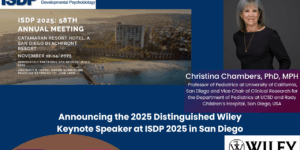Announcing the 2025 Distinguished Wiley Speaker – Christina D. Chambers, PhD, MPH
Christina Chambers, PhD, MPH
Professor of Pediatrics at University of California, San Diego and Vice Chair of Clinical Research for the Department of Pediatrics at UCSD and Rady Children’s Hospital, San Diego, USA







